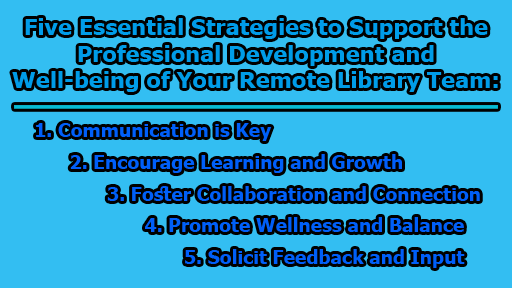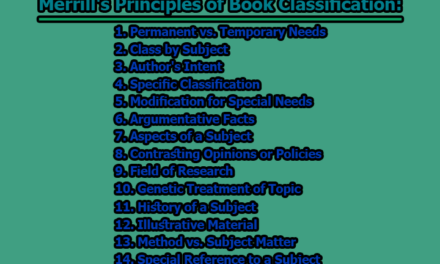Five Essential Strategies to Support the Professional Development and Well-being of Your Remote Library Team:
In the ever-evolving landscape of libraries, the role of remote library teams has become increasingly vital. These teams are entrusted with the responsibility of serving patrons and communities from afar, adapting to changing trends and technologies and fostering a sense of connectivity despite the physical distance. In this article, we will explore five essential strategies to support the professional development and well-being of your remote library team.

1. Communication is Key: In a remote library team, clear and consistent communication is the linchpin that holds the operations together. To ensure effective communication, it is imperative to establish various channels, including email, phone, video conferencing, chat, and project management tools. Each channel serves a different purpose and allows team members to communicate according to their preferences and the context of the situation.
Furthermore, frequent and purposeful communication is vital. Setting expectations, providing feedback, sharing updates, and acknowledging achievements create a sense of direction and accomplishment. Team meetings conducted through video calls can facilitate group discussions, while quick questions can be answered through chat, and formal reports can be exchanged via email. Effective communication ensures that everyone remains on the same page and fosters a sense of belonging.
2. Encourage Learning and Growth: In the dynamic world of libraries, professional development is a must. Remote library staff must continually update their skills, stay informed about changing trends, and adapt to new technologies. To support their growth, library managers can provide access to online courses, webinars, podcasts, blogs, newsletters, and other resources that are relevant to their roles and interests.
Moreover, creating opportunities for staff to share their learning with each other can foster a culture of continuous improvement. Virtual brown bag sessions, online discussion forums, and guest speaker invitations are great ways to facilitate knowledge sharing. Encouraging staff to explore personal projects, hobbies, and passions can also enrich their skills and creativity, contributing to their overall growth.
3. Foster Collaboration and Connection: Remote work can sometimes lead to feelings of isolation and loneliness, especially for library staff who are accustomed to interacting with patrons and colleagues in person. To counteract this, library managers can take proactive measures to foster collaboration and connection within the team.
Establishing common goals, celebrating successes, acknowledging challenges, and providing support can create a sense of identity and belonging among remote staff. Organizing virtual coffee breaks, happy hours, games, trivia, and other fun activities can facilitate social interaction and bonding. These initiatives help staff relax and get to know each other better, leading to improved team dynamics.
4. Promote Wellness and Balance: Working from home, while convenient, can sometimes result in challenges related to wellness and balance. Stress, burnout, distraction, and overwork are real concerns that need to be addressed. To promote well-being, library managers should lead by example and encourage healthy habits and behaviors among their remote staff.
Setting realistic expectations, respecting boundaries, offering flexibility, and providing necessary resources are key components in achieving a healthy work-life balance. Encouraging staff to take care of themselves physically, mentally, and emotionally through regular breaks, exercise, meditation, proper sleep, and other self-care practices can go a long way in preventing burnout and stress-related issues.
5. Solicit Feedback and Input: The best way to support your remote library team is to listen to their needs and preferences. Regularly seeking feedback and input from your staff can foster a culture of mutual respect, collaboration, and continuous improvement. Managers can conduct surveys, polls, interviews, or establish suggestion boxes and feedback loops to collect valuable insights from their team members.
Involving staff in decision-making, planning, and problem-solving not only shows that their opinions matter but also helps in making informed and inclusive decisions. By actively involving staff in shaping the direction of the library team, managers demonstrate their commitment to valuing contributions and ensuring job satisfaction.
In conclusion, supporting the professional development and well-being of your remote library team is crucial for a successful and harmonious work environment. Effective communication, learning opportunities, fostering connection, promoting wellness, and actively seeking input from your staff all contribute to a cohesive and thriving remote library team. By implementing these strategies, library managers can ensure that their team members are equipped with the tools and support; they need to excel in their roles and maintain a healthy work-life balance.

Library Lecturer at Nurul Amin Degree College









